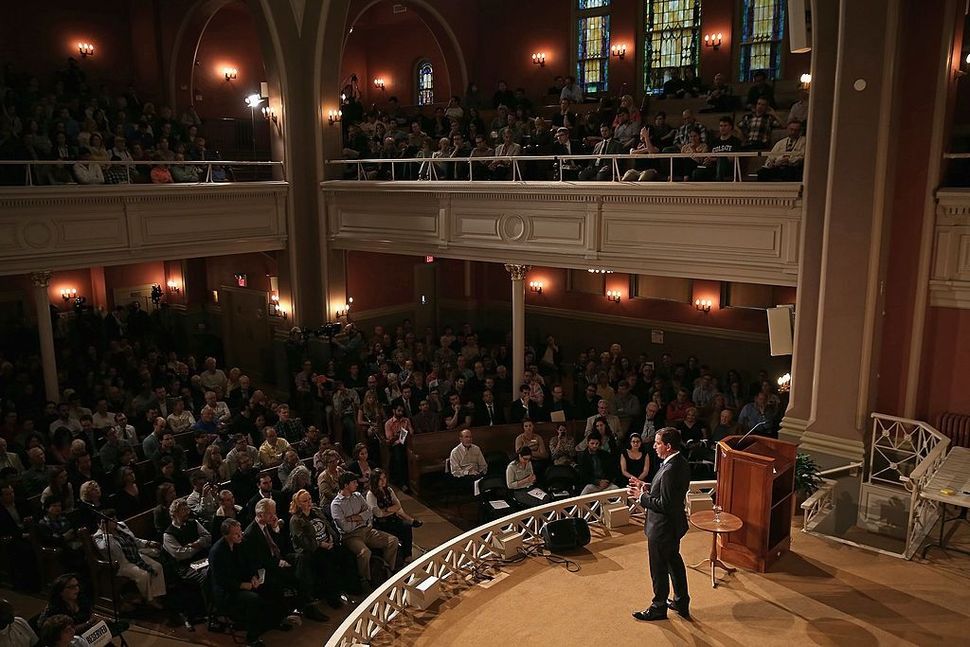‘All the lights were off, except for one…the ner tamid’

The Sixth and I synagogue during happier times in 2014. Image by Getty Images

The Sixth and I synagogue during happier times in 2014. Image by Getty Images
For many religious people across the world, the loss of not being able to go into “the office” is coupled with the loss of another important source of connection, belonging and purpose – one’s house of prayer.

The author. Image by Courtesy of Aaron Potek
For me, they happen to be the same place. I’m one of the rabbis at Sixth & I Historic Synagogue in Washington, DC, and, like so many others, I haven’t been to my place of work/worship (workship?) in over two months.
The few days before we decided to officially close our doors, I was actually out sick (strep, not the coronavirus), so I never got the chance to pack up my things. Nothing on my desk – covered with stacks of papers, open books and an open laptop, even a used tea bag (a tea bag is good for at least 2 cups) – had been essential for my Zoom-based rabbi-ing at home, so it remained untouched, like an embarrassingly disappointing time capsule.
Last week, I finally needed my laptop for something work-related, so I covered my face with my Bonnaroo 2017 bandana, hopped on a bikeshare, and headed downtown. I had planned to simply run in, grab the laptop, and bike home, but when I entered the building, what I knew factually hit me on an emotional level: our sanctuary, ordinarily filled most days of the week with prayer services, concerts, book talks, podcast recordings, etc., had been vacant for months.
I was compelled to make what felt like a shiva visit to a space that, though unchanged, had been transformed. “It is better to go to a house of mourning than to go to a house of feasting…” The words of Kohelet ran through my mind as I took in the somber silence. “…for death is the destiny of everyone; the living should take this to heart.” Thanks, King Solomon. As if I needed the reminder these days.
All the lights were off, except for one. As is true in synagogues across the world, an eternal flame, a “ner tamid,” sits atop the ark containing our Torah scrolls. “Command the Israelite people to bring you clear oil of beaten olives for lighting, for kindling lamps continually… from evening to morning.” Light in the darkness – a powerful image, both literally and metaphorically.
Realizing that this original source for the ner tamid was from that week’s Torah portion, Parshat Emor, added another layer of wonder to this seemingly preordained moment. The synchronicity continued at home later that evening, as I read a short piece in the New Yorker about the Hudson Theater on Broadway:
“A drained wash of yellowish light came from a single bulb on the lip of the stage. Each Broadway theatre has one: a ghost light, which goes on as soon as the house clears out after a performance. Every theatre, it’s said, is inhabited by a ghost. The light keeps the ghost company, or acts as an offering to keep away curses, or illuminates the stage as the spectral performer plays all night. The upshot of the superstition is that, real bodies be damned, some implicit spiritual theatrical event is always under way, wherever there’s a stage. The ghost lights on Broadway have been shining uninterrupted since March.”
These similar traditions point to a universal discomfort with the emptiness of our sacred places. Of course, this isn’t really about the physical spaces or the metaphysical beings that may or may not reside there. They don’t need the light. We do.
Our discomfort around empty spaces is a projection of our fear of the empty spaces within ourselves. Light fills the absence we wish wasn’t there in the first place. Like a moth, we’re drawn to return to the eternal flame, a symbol for our collective yearning for what’s gone missing.
But the light also gently reassures us that, even in the darkest void, something remains. As Rabbi Levi taught nearly 2000 years ago: “Whenever it is said that there is nothing, there is something.” All is not lost. We are not alone. And we will return. When we do, the light will be there, as it always has been, ready to greet us.
Rabbi Aaron Potek works at Sixth & I Historic Synagogue in Washington, DC. He was ordained from Yeshivat Chovevei Torah Rabbinical School in 2013.
























